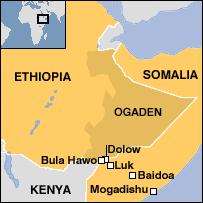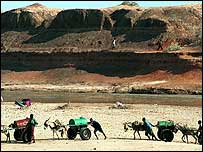Ilankai Tamil Sangam30th Year on the Web Association of Tamils of Sri Lanka in the USA |
|||
 Home Home Archives Archives |
Ethiopia is Said to Block Food Aid to Rebel Regionsby Jeffrey Gettleman, International Herald Tribune, July 21, 2007
NAIROBI, Kenya: The Ethiopian government is blockading emergency food aid and choking off trade to large swaths of a remote region in the eastern part of the country that is home to a rebel force, putting hundreds of thousands of people at risk of starvation, Western diplomats and humanitarian officials say. The Ethiopian military and its proxy militias have also been siphoning off millions of dollars in international food aid, and using a United Nations polio eradication program to funnel money to their fighters, according to relief officials, former Ethiopian government administrators and a member of the Ethiopian Parliament who defected to Germany last month to protest the government's actions. Humanitarian officials say the ban on aid convoys and commercial traffic, intended to squeeze the rebels and dry up their bases of support, has sent food prices skyrocketing and disrupted trade routes, preventing the nomads who live there from selling their livestock. Hundreds of thousands of people are now sealed off in a desiccated, unforgiving landscape that is difficult to survive in even in the best of times. "Food cannot get in," said Mohammed Diab, the director of the United Nations World Food Program in Ethiopia. The Ethiopian government says the blockade covers only strategic locations, and is meant to prevent guns and matériel from reaching the Ogaden National Liberation Front, the rebel force that the government considers a terrorist group. In April, the rebels killed more than 60 Ethiopian guards and Chinese workers at a Chinese-run oil field in the Ogaden. But Western diplomats have been urging Ethiopian officials to lift the blockade, arguing that the many people in the area are running out of time. "It's a starve-out-the-population strategy," said one Western humanitarian official, who did not want to be quoted by name because he feared reprisals against aid workers. "If something isn't done on the diplomatic front soon, we're going to have a government-caused famine on our hands." The blockade, which involves soldiers and military trucks cutting off the few roads into the central Ogaden, comes as Congress is increasingly concerned about Ethiopia's human rights record. Ethiopia is a close American ally and a key partner in America's counterterrorism efforts in the Horn of Africa, a region that has become a breeding ground for Islamic militants, many of whom have threatened to wage a holy war against Ethiopia. The country receives nearly half a billion dollars in American aid each year, but this week, a House subcommittee passed a bill that would put strict conditions on some of that aid and ban Ethiopian officials linked to rights abuses from entering the United States. The House also recently passed an amendment, sponsored by J. Randy Forbes, a Virginia Republican, that stripped Ethiopia of $3 million in assistance to "send a strong message that if they don't wake up and pay attention, more money will be cut," Forbes said. Ethiopia's pardon on Friday of 30 political prisoners who had been sentenced to life in prison could ease some criticism. But Senator Patrick Leahy, Democrat of Vermont, is pushing ahead with measures to more closely vet assistance to the Ethiopian military. According to human rights groups and firsthand accounts, government troops have gang raped women, burned down huts and killed civilians. American officials in Ethiopia said they were trying to investigate the situation but that the Ogaden was too dangerous right now for a fact-finding mission. American officials said they had heard persistent reports of burned villages and that the blockade was putting the area on the cusp of a crisis. Villagers say that anyone who criticizes the government risks getting killed. According to Ogaden Online, a Canadian-based news service that has been highly critical of the Ethiopian government and covers the region through a network of reporters and contributors, some equipped with satellite phones, four young men who were videotaped by The New York Times at a community meeting in an Ogaden village in May were later tortured and executed. The claim could not be fully verified independently, but their identities may have been discovered by Ethiopian soldiers who had arrested three journalists for The Times in the Ogaden and confiscated their notebooks, cameras and computers. "The army is out of control," said Jemal Dirie Kalif, the member of Parliament who defected. The blockade has been in place since early June, and thousands of people have already fled on foot and by camel. Two weeks ago, Abdullahi Mohammed, a 17-year-old student, walked from his village deep in the Ogaden to the nearest town with a bus station. He carried with him a few pieces of bread. He said that when he stopped to ask villagers in the Ogaden for food, they asked him for some instead. "They had nothing," he said. Though good rains this year have fed the few crops in the area and provided a little cushion, "The most these people can last without facing serious problems is one month, maybe two," said David Throp, country director for Save the Children UK. Even if relief trucks are allowed in to all the critical areas, the food might not reach the people who need it. According to humanitarian workers and several former Ethiopian officials, including Kalif, food aid is embezzled in two stages. First, soldiers skim sacks of grain, tins of vegetable oil and bricks of high-energy biscuits from food warehouses to sell at local markets. "The cash is distributed among security officers and regional officers," a former government administrator from the Ogaden region said in a recent telephone interview on condition of anonymity because he still works with government officials. Then the remaining food is hauled out to rural areas where the soldiers divert part of it to local gunmen and informers as a reward for helping them fight the rebels. The former administrator said he also knew of specific cases in which army officers stole food from warehouses and gave it to the families of women whom their soldiers had raped, as compensation. Several Western humanitarian officials estimated that 20 to 30 percent of the donor countries' food aid to the Ogaden — aid that last year was valued at more than $70 million — routinely disappears this way. To cover their tracks, the soldiers and the government administrators who work with them tell the aid agencies that the food has spoiled, or has been stolen or hijacked by the rebels, humanitarian officials said. Relief workers in Ethiopia have known about these problems for several years, a humanitarian official said, and have tried to set up committees of local elders to oversee distribution. But that did not work either, and aid officials eventually concluded that as long as the majority of the food was getting through, they would not stop the shipments. When informed about these allegations, Diab of the World Food Program said, "This is the first I've heard of them." Mohammed, the government spokesman, denied that Ethiopian troops were pilfering or mishandling foreign aid. "We don't do that," he said. As the food crisis looms, Western diplomats are also concerned about a separate plan by the regional government in the Ogaden to divert a share of its own budget for development projects — like schools and farming — to the Ethiopian military. This seems to be part of the Ethiopian government's strategy to do whatever it takes to crush the rebels, who have deep popular support and, according to the government, are getting arms and training from neighboring Eritrea, Ethiopia's bitter enemy. The people of the Ogaden are mostly Somalis and ethnically distinct from the highland Ethiopians who have ruled the country for centuries, and the long battle over the region has been steadily escalating this year. The country director of one Western aid agency, who recently returned from a field visit there, said he saw two villages that had been burned to the ground and several schools that had been converted into military bases, with foxholes. Humanitarian officials say the military is building up militias and setting the stage for clan-based bloodshed. The rank and file of the Ogaden National Liberation Front tend to be members of the Ogaden clan, and so the government has turned to other clans to form anti-rebel militias. In the past few weeks, thousands of men have been armed. "Those Ethiopians are smart," Kalif, 32, said. "They know Somalis are more loyal to clans than anything else." Tactics like these, he said, drove him to defect June 20 while attending a conference in Wiesbaden, Germany. He was affiliated with the governing party, and had been representing an area in the eastern Ogaden for the past seven years. He described a scheme with a United Nations polio program, which was corroborated by two former administrators in the Ethiopian government and a Western humanitarian official, in which military commanders gave prized jobs as vaccinators to militia fighters, and in the end, much of the polio vaccine was never distributed. "Army commanders are using the polio money to pay their people, who don't pass out the vaccines, so the disease continues and the payments continue," said Kalif. "It's the perfect system." United Nations officials in Geneva said they did not know whether that was happening, but that they would investigate. When asked how he knew about the polio scheme, Kalif said: "Everybody out there knows. They're just too scared to talk." "If I don't get asylum and they send me back to my country, I'm dead," he added. "But I was sick of being a parrot. I have no regrets." |
||
|
|||
 The blockade takes aim at the heart of the Ogaden region, a vast desert on the Somali border where the government is struggling against a growing rebellion and where government soldiers have been accused by human rights groups of widespread brutality.
The blockade takes aim at the heart of the Ogaden region, a vast desert on the Somali border where the government is struggling against a growing rebellion and where government soldiers have been accused by human rights groups of widespread brutality. "This is not a government which punishes its people," said Nur Abdi Mohammed, a government spokesman.
"This is not a government which punishes its people," said Nur Abdi Mohammed, a government spokesman.